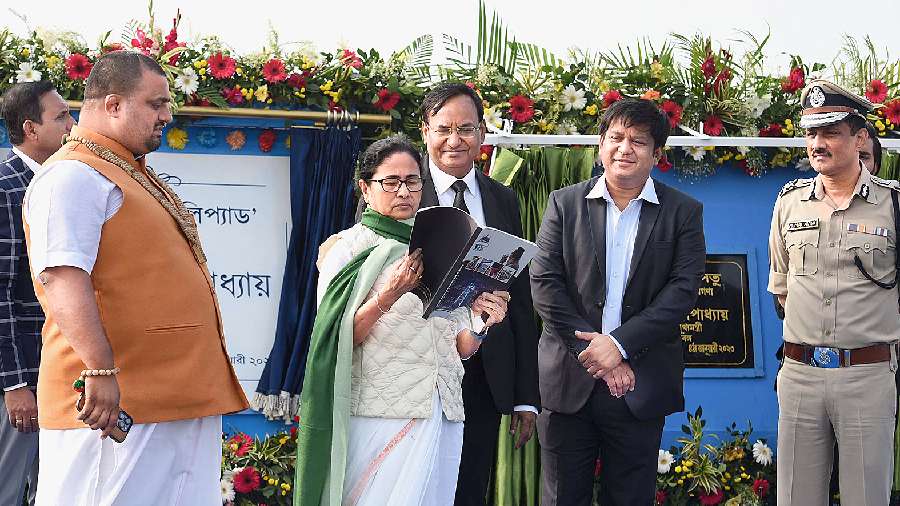Mamata Banerjee on Wednesday said the Narendra Modi government was not coughing up even a single paisa in organising the Gangasagar Mela, while it bore the entire cost of organising the Kumbh Mela in Uttar Pradesh.
“The Central government bears the entire cost of Kumbh Mela but it doesn’t even pay a paise towards buying batasha (a traditional south Asian sugar-based candy often used as prayer offerings by some Hindus). The entire cost to organise this fair is borne by the state government,” said the Bengal chief minister after inaugurating permanent helipads near Sagar Island that would help connect the pilgrimage with an aerial service.
Mamata said she would write to the Centre urging it — yet again — to announce the Gangasagar Mela as a national fair very soon as lakhs of people thronged the pilgrimage every year to take a dip deemed holy after undertaking a hectic four-hour journey across waterways.
“I also consider Kumbh as a unique religious fare in the world. You have to remember that Kumbh Mela is well connected with civil aviation and railways. But the Gangasagar Mela is in a remote location and people need to come here by crossing waterbodies,” said Mamata, pointing out how organising such a fair alone had been a tough task for her government.
In the past few years, the Trinamul Congress government has undertaken a cluster of religious initiatives to promote and brand Bengal’s famous Gangasagar Mela after a thorough study on how the event could be promoted among an even larger number of people outside the state, especially in north India.
Officials studied the Kumbh Mela in Allahabad and a few other events associated with Hinduism observed during the Makar Sankranti elsewhere in the country to take ideas for the initiatives for devotees to participate in, in person or virtually. The aim was to brand the mega Hindu festival on the state’s southern coast as a peer of the Kumbh event.
Sources in the ruling dispensation said the chief minister’s visit — a regular affair ahead of the Mela — and the preparations by her government for the event were part of a larger message to those outside Bengal, especially in the northern states, as her party prepares to expand its footprint beyond Bengal in the run-up to the general election of 2024.
The Trinamul Congress chief mounted an attack on the Centre over how the BJPled government, a belligerent promoter of Hindutva, is allegedly biased against Bengal.
“We need to construct a large bridge over the Muriganga to enhance road communication with the island, as it takes a lot of time in crossing the river to reach Gangasagar. We did not get justice from the central government even after writing to them many times (seeking funds to build a bridge). So, we have plans to set up a bridge with a cost of Rs 10,000 crore,” said Mamata, explaining that it would take time to implement the large-scale project.
She also elaborately explained how her government has enhanced communication by dredging rivers to make waterways communication faster and developed infrastructure to provide necessary services including healthcare and lodging for the pilgrims – expected to add up to 30 lakh this year.
Mamata said her government would very soon start the helicopter services and it would be managed online by the transport department. The state government has spent around Rs 5 crore to setup three permanent helipads,a lounge and a decorated garden.
Mamata visited the Kapil Muni ashram and the Bharat Sevashram Sangha, where she tried to reach out to the Bengali Hindus, interacting with them in Hindi.
Outreach
Mamata visited a house in Ganganagar as part of Trinamul’s me ga outreach drive called Didir Suraksha Kawach. Sources said she stopped at a roadside gift shop owned by a local Trinamulsupporter. Ajay Tung. She entered his home after she came to know that his family lived behind the shop. She spoke to them for around 10 minutes.
“I am overwhelmed by the visit,” said Tung.
“She spoke to me like a family member and enquired about our livelihood,” he added. In his early 50s, he lives with his wife and two sons, who are migrant workers.

